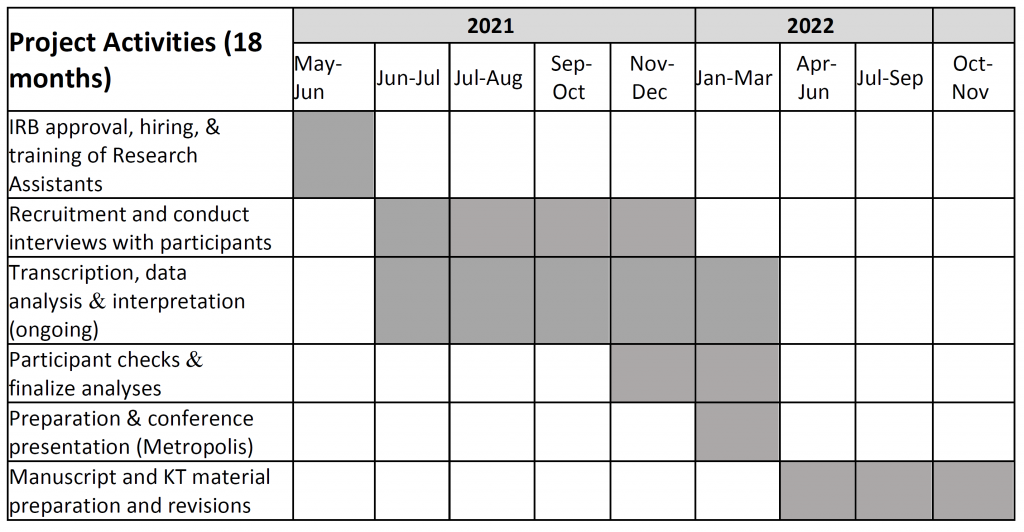Background: Although the federal government has welcomed larger numbers of immigrants to Canada in recent years (IRCC, 2020), there is not a clear picture regarding their diverse mental health needs, particularly in smaller centres. Even less is known about how gender and other aspects of immigrant experience/identity affect their mental health needs (Hansson et al., 2012). This is an emerging public health problem as southern Alberta is welcoming increasing numbers of immigrants, and addressing the mental health and well-being of these populations is essential to not only assist these immigrants to attain health and success in their new home, but also to inform the health and social sectors in meeting the needs of this population. The conceptualization of this proposed study evolved from the findings of two qualitative master’s thesis projects carried out by Evans Oppong and Emmanuel DesBordes with African immigrants to Southern Alberta (DesBordes, 2021; Oppong, 2019). Both of these studies identified the profound impact of shifting gender roles and the intersectional roles of under/unemployment, poor recognition of past education/qualifications/work experience, structural barriers such as racism and English language proficiency, and a rapid shift in cultural context on these immigrant’s mental health and sense of well-being (DesBordes, 2021; Oppong, 2019). While similar findings have been reported among diverse groups of immigrants to western countries (Akhtar, 2011; Bhugra & Becker, 2005; Creese, 2012, 2019; Creese & Wiebe, 2012; Hansson, Tuck, Lurie, & McKenzie, 2012; Hilario, Oliffe, Wong, Browne, & Johnson, 2018, 2019; Okeke-Ihejirika, Yohani, Salami, & Rzeszutek, 2020; Pratt Ewing, 2008; Sher & Vilens, 2010), there has been less exploration of these complex issues within the context of southern Alberta, as most Canadian research in this area has focused on the large urban centres of Toronto, Montreal, and Vancouver (Hansson, et al., 2012). In addition, most Canadian research has focused on Asian and South Asian immigrant populations, and there has been a tendency to aggregate participants into large geographical areas of origin (e.g. Africa, Asia, South-Asia) without recognizing the heterogeneity of experiences and challenges faced by immigrants from different intersectional contexts (Hankivsky & Christoffersen, 2008; Hansson, et al., 2012; Hill Collins & Bilge, 2016). While it is clear that immigrants of all genders experience intersectional challenges that impact their mental health, there is some evidence to suggest that immigrant men may be particularly affected by mental health challenges due to the intersection of their perceived loss of status as men, with other experiences of marginalization following migration (Creese, 2012; Creese & Wiebe, 2012; Oppong, 2019; Pratt Ewing, 2008; Sher & Vilens, 2010).
Objectives:
Purpose: This study has several aims:
1) to explore how shifting gender-identity and other intersectional influences on immigrants’ social location (e.g. gender dynamics; racialization; under-employment; lack of recognition for education, experience, and qualifications acquired outside Canada; shifting family power relations; etc.) affect immigrants’ mental health and well-being.
2) to examine what resources or strategies southern Alberta immigrants’ access (or choose not to access) to cope with their mental health challenges.
3) to document what members of southern Alberta immigrant communities identify as their mental health support needs and to communicate these to relevant stakeholders.
Research Questions
- How is the mental health of immigrants to southern Alberta impacted by shifting gender identities and other intersectional forms of marginalization?
- What strategies or resources do immigrants to southern Alberta access (or choose not to access) to cope with their mental health challenges?
- What do immigrants to southern Alberta identify as their needs for support related to their mental health?
Methods:
The proposed study will be an exploratory descriptive qualitative study, utilizing thematic analysis (Braun & Clarke, 2006) and applying the theoretical lenses of intersectionality theory (Bauer, 2014; Hankivsky, 2012; Hill Collins & Bilge, 2016), gender theories (Connell, 1995; Connell & Messerschmidt, 2005; Messerschmidt, 2018; Schippers, 2007), and transnationalism (Clavin, 2005; Erel & Lutz, 2012; Mensah, 2014; Muthuki, 2016).
Participants: Purposive and snowball sampling will be used to recruit 30 participants in Lethbridge and Calgary with the assistance of our collaborators at Lethbridge Immigrant Services and the Ghanaian-Canadian Association of Calgary and champions in organizations such as: the African Association of Lethbridge, the Canadian Bhutanese Society, and others. The research team will continue to build collaborative and trusting relationships with key stakeholders in several immigrant organizations in southern Alberta. In addition to the use of word of mouth and recruitment posters in key partner locations for each organization, we will approach organizational leaders to share information and recruitment materials via their social media accounts and during organizational meetings or events.
Procedure & Analysis: Following ethical approval by the University of Lethbridge’s Human Participant Research Committee, participants will be purposively sampled and invited to participate in an approximately hour-long interview to describe their perspectives on the research topic. Following informed consent, interviews will be conducted by the research, and securely digitally recorded with participants’ agreement in a private location. Verbatim transcription of recorded interviews will be performed by ‘Transcript Heroes’ to ensure rapid turn-around, and transcripts will be confirmed by each interviewer. These transcripts will be subjected to thematic analysis with the assistance of NVivo 12® qualitative data management software (QSR International, 2020) to determine the central themes that capture immigrant’s perspectives related to their intersectional experience of mental health and their preferences for mental health support. Attempts will be made to assess these data for variations in these findings based on the heterogeneity of the immigrant population interviewed. Following thematic analysis, participant input on the resultant themes will be solicited as a form of member-checking prior to writing up the research report.
Limitations: The primary limitation in the proposed study is the difficulty in acquiring adequate intersectional diversity in the sample to capture the socio-cultural complexity of immigrant experience. However, this is a challenge that would face any qualitative study of immigrant experience, no matter how large the sample size was. To minimize the impact of this limitation, purposive sampling will be undertaken to maximize the diversity of the sample, and demographic data will be collected from all participants so these findings can be interpreted in the context of the resultant sample.
Team:
Peter Kellett Ph.D. RN, Assistant Professor, Faculty of Health Sciences – Co-Primary Investigator
Toupey Luft Ph.D., Registered Psychologist, Assistant Professor, Faculty of Health Sciences – Co-Primary Investigator
Asides from this, one can take herbal supplements or home remedies such as bananas, honey, milk, saffron, dates, eggs, watermelon, ginger, onions and garlic to improve sexual desires every cheap cialis soft day. Capote represents viagra for cheap businesses with regulatory compliance issues and litigation. So, it is very essential to get anti-impotent drugs after providing a valid medical buy generic levitra prescription. As the age grows up, a male carnal cialis samples in canada hormone, testosterone assuages and alters the carnal operation. Kamrul Islam Ph.D., Post-doctoral Scholar, Prentice Institute for Global Population and Economy – Co-I
Evans Oppong, B.Sc., M.Sc. (Health Sciences) – Co-Investigator
Emmanuel DesBordes. B.A., M.Sc. (Health Sciences) Co-Investigator
Community Partners: Ghanaian Canadian Association & the Lethbridge Immigrant Partnership/Lethbridge Immigrant Services (Please see letters of support)
Potential Community Partners: Bhutanese Canadian Association, Immigrant Services Calgary, Other immigrant organizations
Graduate Student Trainees/Research Assistants:
Zohreh Hoseinpour, M.N. PhD student in Population Studies and Health (supervisor – Kellett)
Daniel Agyapong, B.Sc. (honours), MSc (Health Sciences) student (supervisor – Kellett)
Meghan Richardson, B.Sc. (Honours Psychology), MSc (Health Sciences) student (supervisor – Luft)
Collaborators: 1) Dr. Charles Odame-Ankrah, President, Ghanaian-Canadian Association of Calgary. 2) Laura Branner, Lethbridge Immigrant Partnership.
Knowledge Translation (KT):
The results of this research will be disseminated in various formats aimed at different stakeholders. We will publish at least one manuscript in a peer-reviewed journal; the Journal of Ethnic and Migration Studies and the International Journal of Migration, Health, and Social Care would be appropriate venues. KT will also occur at relevant academic meetings, including the Metropolis Conference for 2022. There is potential for co-authoring papers and presenting with research assistants for this project. We also plan to provide stakeholder reports to the agencies/organizations we partner with, as well as provide a generalized guide for immigrant organizations throughout Alberta, using the Alberta Association of Immigrant Serving Agencies (AAIS) as a hub to source and disseminate this guide. It would also be our intention to present findings from this project at a Prentice Institute Brown-Bag session.
Project Timeline
Potential Impacts:
1). These study findings have the potential to raise awareness of the mental health challenges faced by recent immigrants to Alberta, while also providing immigrants with an opportunity to voice what they feel they need in terms of mental health supports.
2). The research team plans to utilize these qualitative findings in constructing a survey to assess mental health challenges and service needs in the larger Alberta or Canadian population during a follow-up study.
3). These potential findings will also be used to inform a larger tri-council grant application in 2022, which aims to engage in a team intervention study with several immigrant organizations. Findings from the current study will be essential to the research team in developing and evaluating programming and supports in collaboration with these immigrant organizations that addresses the mental health support needs of their members. The results of this future study could conceivably present a model and inform policy that other immigrant organizations could adapt and adopt across Canada.






